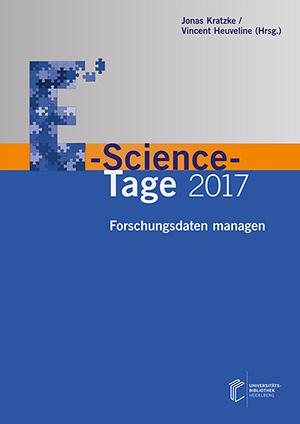Zitationsvorschlag
Lizenz (Kapitel)

Dieses Werk steht unter der Lizenz Creative Commons Namensnennung - Weitergabe unter gleichen Bedingungen 4.0 International.
Veröffentlicht
Research Data Management training and support services at both ETH Zurich and EPF Lausanne
Abstract The management of research data throughout its life-cycle ensures its long-term value and preservation, as well as being a key prerequisite for effective data sharing. Many funding bodies mandate the creation of data management plans and open access publication of the research results they funded. In order to concentrate the efforts of different universities, libraries, and IT-services, the project “Research Data Life-Cycle Management: From Pilot Implementations to National Services (Data Life-Cycle Management, DLCM1)”, was launched by eight Swiss Higher Education Institutions on behalf of the former Swiss University Conference (SUC) as part of the programme SUC P-2 “DLCM”, which is chiefly designed to improve the handling of scientific information in Switzerland.
With the start of DLCM in 2015 the Libraries of the two Swiss federal institutes of technology, EPF Lausanne and ETH Zurich, rose to the occasion and strengthened their respective initiatives and efforts by creating
personalized data management plan (DMP) services and training sessions on research data management. The services and training sessions were set up in close collaboration with the scientific IT departments and the Research Office at EPFL Library and ETH Library, thus enabling the libraries to offer expertise tailored to researchers’ needs, and to cover the entirety of the data life-cycle. The closer collaboration with researchers during training sessions and consultations contributed to the establishment of stronger trust relationships between scientists and information professionals at the two Swiss federal institutes of technology. A mutual learning process was sparked, allowing both sides to share best practices and tackle new challenges together.
By building on existing experiences, resources, and tools available within Swiss higher education institutions, the DLCM project focuses on the common goals: to harmonize and strengthen research data management
practices across actors (researchers and information professionals), disciplines (sciences, social sciences, and
humanities), and institutions (universities, universities of applied sciences, and universities’ service providers) in a sustainable way. While universities are obviously competing for funding, students, and scholarly excellence, there is a need to use available resources efficiently and also to share best practices acknowledging the high level of staff mobility between institutions. With this background, we aim to share our insights, experiences, and evolving best practices regarding research data management training, resources, and support services. To this end, our paper focuses on four major aspects: our new data management training, our personalized research data management support services, our lessons learned and how we envision the way forward.
Keywords Research data management, training, services, best practice, Switzerland



